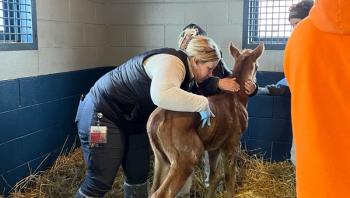
AVMA vaccine report surprises skeptics
Sandy Spring, Md.-For years Dr. Lorraine Jarboe followed a cookie cutter approach to vaccinations, immunizing dogs with a myriad of annual boosters.
Sandy Spring, Md.-For years Dr. Lorraine Jarboe followed a cookie cutter approach to vaccinations, immunizing dogs with a myriad of annual boosters.
Dr. Don Klingborg
Then the American Veterinary Medical Association's (AVMA) Council on Biologic and Therapeutic Agents (COBTA) published its much-anticipated canine and feline vaccine report. Reading the Nov. 15 Journal of the American Veterinary Medical Association (JAVMA), Jarboe says she's now at ease promoting individualized vaccine protocols. For those once-habitual yearly inoculations, she modifies, pitting patient need against side effects and risk.
"I can feel comfortable vaccinating against diseases like distemper on a case-by-case basis," she says. "I'm really happy. The AVMA finally said something."
'A new era'
What AVMA says is "vaccines are a potent medical procedure associated with benefits and risk." The COBTA report tells practitioners it's OK to buck the tradition of annual vaccinations and consider "exposure probability, susceptibility, severity of disease, efficacy and safety of vaccines, potential public health concerns and owner's preferences" before inoculating. In other words, AVMA stands by a veterinarian's clinical judgment in vaccine decision-making rather than blindly inoculating.
Dr. Ron Schultz
"It's a new era," says Dr. Don Klingborg, former COBTA chair and researcher on the document. "We've come an amazing distance on this. The report brings with it a great opportunity to move forward on the issue of vaccines."
Inside the report
Critics have long debated the efficacy, duration of immunity and necessity of many vaccines, associating annual inoculations with cancer and autoimmune disease. While the COBTA report calls for education and the profession's reduced dependence on vaccine sales, for many veterinarians, it also legitimizes some long-held uncertainties untouched by previous AVMA Principles of Vaccinations reports, which detractors deem vague and useless.
"I'm impressed because this new report really provides a whole new mindset and approach to vaccines," says Dr. Ron Schultz, an immunologist at the University of Wisconsin-Madison School of Veterinary Medicine. At the forefront of vaccine research, Schultz has cautioned against vaccine overuse for more than 30 years. "This is a big step for AVMA. This report is, in fact, not too different from things I've written in my own papers and have personally been striving toward for years."
Dr. John Albers
Changing mindset
Schultz and his colleagues suspect vaccines not only have harmful side effects, they last much longer than manufacturers indicate.
The United States Department of Agriculture (USDA), which oversees biologics, bases its annual booster recommendations on manufacturer duration of immunity tests, which the agency mandates for just up to one year. USDA then inserts annual booster recommendations in the sleeves of most vaccine products, charging veterinarians to follow the suggested protocols.
Changing federal standards can be an arduous process, Klingborg says, but so far, the agency has worked with AVMA on supporting its new stance.
"Government moves slowly," he says, "but we couldn't have better interaction. They understand fully where we are coming from. What they want is more science on the table."
That science isn't easy to come by. The extreme expense of isolating animals for years at a time hampers manufacturers' efforts to study vaccines' duration of immunity or long-term side effects. The research has been left up to scientists like Schultz while vaccine proponents poke holes in their work.
"I'm hoping this report is a turning point," Schultz says. "It takes a national association like AVMA to really move this whole issue forward."
A step back?
But the national association still isn't reflecting the viewpoint of practitioners in the trenches, claims Dr. Jean Dodds, an immunologist and hematologist in California. While the AVMA report invites reader input, at presstime, Dodds was the organization's sole respondent. Her letter, criticizing the report's section on serologic tests, and COBTA's response to it, can be read in the Jan. 15 JAVMA issue.
"The report says titers are generally unreliable for gauging resistance and that's just nonsense," she says. "Average practitioners today need some assurance that animals have memorable immune memory before deciding against boosters. That's what titers provide."
AAHA report to come
It's a topic the American Animal Hospital Association (AAHA) is sure to cover when it comes out with canine vaccine guidelines this spring, Dodds adds.
"It'll be so embarrassing for AVMA when the AAHA report comes out and says entirely different things," she says.
But the AAHA report, likely to run in a March JAVMA issue, encourages many of the same ideas found in the AVMA's work, says AAHA Executive Director Dr. John Albers.
It goes further to make specific vaccine recommendations, but the AVMA's report is an important overview, he adds.
"I think it's actually well done," Albers says. "I don't think there's anything in it we or anyone else can take issue with. They did a great job of summarizing what's known about vaccines."
Newsletter
From exam room tips to practice management insights, get trusted veterinary news delivered straight to your inbox—subscribe to dvm360.






